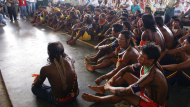Hundreds Occupy Belo Monte Dam Site in Brazilian Amazon
Tica Minami, + 55 11 6597-8359 , ticaminami@gmail.com (Movimento Xingu Vivo para Sempre)
Caroline Bennett, + 1 415 487 9600 , caroline@amazonwatch.org
Christian Poirier (in Brazil), + 55 116597 8359 , christian@amazonwatch.org
Tica Minami, + 55 11 6597-8359 , ticaminami@gmail.com (Movimento Xingu Vivo para Sempre)
Caroline Bennett, + 1 415 487 9600 , caroline@amazonwatch.org
Christian Poirier (in Brazil), + 55 116597 8359 , christian@amazonwatch.org
Sheyla Juruna, indigenous leader from Brazil,
available for interviews in Washington, D.C.
(Hi-res photos available upon request)
Altamira, Brazil Hundreds of indigenous leaders, fishermen and riverine people from the Xingu River basin have gathered to occupy the Belo Monte Dam construction site in a peaceful protest to stop its construction in Altamira, located in the state of Pará in the heart of the Brazilian Amazon. They have vowed to permanently occupy the site and are calling on allied organizations and movements to join them.
The Trans-Amazon Highway (BR-230) has been blocked around the Santo Antônio village, where it passes the proposed construction site. Groups are demanding the presence of a Brazilian government high-level official at the site to initiate a new round of negotiations that are transparent, inclusive and respectful of the rights of local people affected by the dam.
"Belo Monte will only succeed if we do nothing about it. We will not be silent. We will shout out loud and we will do it now," said Juma Xipaia, a local indigenous leader. "We only demand what our Constitution already ensures us: our rights. Our ancestors fought so we could be here now. Many documents and meetings have already transpired and nothing has changed. The machinery continues to arrive to destroy our region."
The Inter-American Commission on Human Rights (IACHR) of the Organization of American States (OAS) has requested explanation as to why the Brazilian Government did not act to ensure the rights of indigenous peoples affected by the dam, as requested by the IAHCR in April. According to the OAS, the Brazilian Government has an obligation of consulting and informing indigenous peoples who will be affected by the dam prior to construction.
Yesterday, the government of Brazil refused to attend a closed hearing convened by the IAHCR intended to foster dialogue toward resolving conflict and discuss failures in protecting the rights of indigenous peoples threatened by the proposed Belo Monte Dam. Plans for the project ignore international protections such as the right to free, prior and informed consent, and jeopardize the health, livelihood and ancestral lands of thousands of indigenous peoples.
Last Monday, a federal judge in Brazil voted that the environmental licensing of the controversial Belo Monte Dam is illegal given the lack of consultations with affected indigenous communities.
For more information, contact:
Tica Minami, + 55 11 6597-8359 , ticaminami@gmail.com (Movimento Xingu Vivo para Sempre)
Caroline Bennett, + 1 415 487 9600 , caroline@amazonwatch.org
Christian Poirier (in Brazil), + 55 116597 8359 , christian@amazonwatch.org

